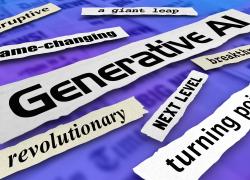3 Great Resources to Kick-Start Your Financial Planning Career
(NewsUSA) - Finding a rewarding career that offers growth potential, work-life balance and the satisfaction of helping others is a key priority for many job seekers. With those goals in mind, a career in financial planning should be a top contender, whether you are just starting out or looking to make a career change. But once you have decided that financial planning is the field for you, how do you get started? Here are three resources that can help you launch a successful financial planning career.
- Finding a rewarding career that offers growth potential, work-life balance and the satisfaction of helping others is a key priority for many job seekers. With those goals in mind, a career in financial planning should be a top contender, whether you are just starting out or looking to make a career change. But once you have decided that financial planning is the field for you, how do you get started? Here are three resources that can help you launch a successful financial planning career.
1. Guide to Careers in Financial Planning. Based on interviews with leading financial services firms, this guide introduces you to the wide range of career opportunities in the financial planning profession. It identifies typical entry points and career tracks, explores the types of companies that hire financial planners and provides information on how to find financial planning career opportunities. It also includes resources such as a list of recommended questions to ask in a job interview.
2. Scholarship Programs. Dozens of scholarship programs are available to support you on your professional journey. Some are offered directly through colleges and universities that have financial planning degree and certificate programs. Others are available through nonprofits and organizations like the CFP Board Center for Financial Planning, which administers 16 scholarship programs that help pay for the education and exam requirements to become a CERTIFIED FINANCIAL PLANNERTM professional. Financial services firms may offer scholarships or tuition reimbursements to employees to cover the costs of obtaining professional designations and credentials such as CFP® certification -- some of which may be required to advance within the company.
3. Career Fairs. In-person and virtual career fairs provide valuable opportunities to connect with prospective employers. CFP Board’s spring and fall career fairs are some of the most popular hiring events in the profession, with dozens of firms participating in these online exhibitions. Job seekers can visit employers’ virtual exhibit booths and view open jobs and internships, apply for open positions and interact with employers through one-on-one video meetings and messaging. You can also visit the CFP Board Career Center to browse current job and internship opportunities in financial planning, as well as a collection of articles providing career guidance.
Other top resources include career offices at your college or university, financial services companies’ career websites and professional organizations that may have a local chapter near you.
Making the most of these resources will not only help you find a financial planning job, but also support your growth and development as a future financial planning professional. To learn more about CFP® certification, visit the CFP Board website.



 - Starting and maintaining a successful small business is a challenge in any setting. For rural entrepreneurs, that struggle is even greater when it comes to accessing capital, high-speed internet and quality workers, according to a survey from SCORE, a nonprofit organization dedicated to helping small businesses since 1964.
- Starting and maintaining a successful small business is a challenge in any setting. For rural entrepreneurs, that struggle is even greater when it comes to accessing capital, high-speed internet and quality workers, according to a survey from SCORE, a nonprofit organization dedicated to helping small businesses since 1964. 
 - Small business owners know that one of the secrets to success is hiring quality employees and keeping them. One of the best ways to keep your best employees happy is by offering a robust benefits plan. In fact, 11 states now mandate that most small businesses offer employees a retirement plan, according to Value Point Associates (VPA), a national Employer Member Association that specializes in offering “large-company” benefits to small and medium-sized businesses.
- Small business owners know that one of the secrets to success is hiring quality employees and keeping them. One of the best ways to keep your best employees happy is by offering a robust benefits plan. In fact, 11 states now mandate that most small businesses offer employees a retirement plan, according to Value Point Associates (VPA), a national Employer Member Association that specializes in offering “large-company” benefits to small and medium-sized businesses. 
 - The unprecedented stress caused by the COVID-19 pandemic pushed many to place a renewed importance on their overall health. This led to a new appreciation for self-care as people began to increasingly dedicate time in isolation to themselves. As people resume their pre-pandemic routines, this newfound commitment to wellbeing and self-care is here to stay, according to The Global State of Self-Care Report. Commissioned by Patchology, an award-winning skincare brand focused on patches and masks, it’s the first study to examine consumers’ self-care practices and trends across the spectrum and in multiple countries. According to the report, not only did 67% of U.S. respondents increase their self-care during the pandemic, but 79% of those people intend to prioritize self-care into the future.
- The unprecedented stress caused by the COVID-19 pandemic pushed many to place a renewed importance on their overall health. This led to a new appreciation for self-care as people began to increasingly dedicate time in isolation to themselves. As people resume their pre-pandemic routines, this newfound commitment to wellbeing and self-care is here to stay, according to The Global State of Self-Care Report. Commissioned by Patchology, an award-winning skincare brand focused on patches and masks, it’s the first study to examine consumers’ self-care practices and trends across the spectrum and in multiple countries. According to the report, not only did 67% of U.S. respondents increase their self-care during the pandemic, but 79% of those people intend to prioritize self-care into the future. 
 - As the post-pandemic travel surge continues, consumers are choosing to prioritize experiences over goods, according to a recent CNBC report.
- As the post-pandemic travel surge continues, consumers are choosing to prioritize experiences over goods, according to a recent CNBC report. 
 - When shoppers are already in pain, navigating the huge selection of products in the over- the-counter (OTC) pain reliever aisle can feel overwhelming. There’s a lot to choose from, and while different medicines might treat similar ailments, shoppers should be aware that some OTC pain relievers could be a better choice for them based on their personal risk factors or other medications they are already taking.
- When shoppers are already in pain, navigating the huge selection of products in the over- the-counter (OTC) pain reliever aisle can feel overwhelming. There’s a lot to choose from, and while different medicines might treat similar ailments, shoppers should be aware that some OTC pain relievers could be a better choice for them based on their personal risk factors or other medications they are already taking.  -
-  “Red Chaos”
“Red Chaos” “Against The Grain”
“Against The Grain” “Cherry Bomb”
“Cherry Bomb” “Alphabet of the Invisible”
“Alphabet of the Invisible”
 -
- 
 - As the holiday season approaches, the revival of in-person events, celebrations, and activities leaves many excited, yet overwhelmed, but the right holiday helpers can make this busy season pleasant. Finding products that can serve double (or triple) duty is the key to success by saving time, money, and energy. One kitchen staple that may surprise you with its versatility is citric acid powder.
- As the holiday season approaches, the revival of in-person events, celebrations, and activities leaves many excited, yet overwhelmed, but the right holiday helpers can make this busy season pleasant. Finding products that can serve double (or triple) duty is the key to success by saving time, money, and energy. One kitchen staple that may surprise you with its versatility is citric acid powder. 
 - Underage drinking levels are at historic lows, and one way to continue this trend is to prevent teens’ access to alcohol. The We Don’t Serve Teens campaign, first developed in 2006, is a community-level collaboration of alcohol suppliers, retailers and distributors working with parents and prevention groups to curb underage drinking.
- Underage drinking levels are at historic lows, and one way to continue this trend is to prevent teens’ access to alcohol. The We Don’t Serve Teens campaign, first developed in 2006, is a community-level collaboration of alcohol suppliers, retailers and distributors working with parents and prevention groups to curb underage drinking. 



